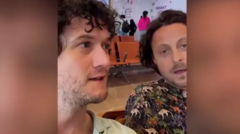Amidst the backdrop of the Carpathian mountains, a unique summer camp unites Ukrainian children who have lost family members in the war. Through group therapy and shared experiences, these children find support while navigating the emotional complexities of their situations, fostering a sense of community and hope in the face of tragedy.
Ukrainian Children Find Solace Together Amid War's Heartache

Ukrainian Children Find Solace Together Amid War's Heartache
A summer camp in western Ukraine offers healing and support for children grappling with the loss of loved ones due to the ongoing conflict.
In the heart of the Carpathian mountains, also known as "Operation Dima", a camp offers a much-needed respite for Ukrainian children coping with the absence of loved ones amid the ongoing conflict. Fifteen-year-old Dima recalls the day of Russia's full-scale invasion when his father told him he might never return. His father joined the military, and in November 2023, he went missing. At the summer camp, Dima shares stories and memories with 49 other children, all of whom face similar heartbreak.
In this supportive environment, the children hold candlelit vigils as they honor their missing loved ones. Many have been affected by the war in multiple ways; some have lost multiple family members, and they find themselves in a constant state of uncertainty. This groundbreaking camp, organized by the charity Gen.Ukrainian, is the first of its kind aimed specifically at children whose parents have disappeared due to the conflict.
Vanui Martirosyan, lead psychologist at Gen.Ukrainian, explains the complex nature of their trauma. Children like Dima search social media desperately, looking for information about their loved ones while grappling with the psychological toll. "They feel fear of crying, thinking it will be everlasting," Martirosyan says. The camp’s program includes group therapy designed not only to support their emotional needs but also to help them navigate their unique situations.
Dima's experiences reflect the challenge of displacement and loss. “I kept hoping until the end that Dad is a prisoner somewhere,” he shares. His mother's pursuit of information about his father’s fate has only heightened their distress, leading Dima to carry the burden of emotional support for her.
With professional help from camp psychologists, activities such as art therapy are utilized to encourage self-expression. Young children depict images of love and family, while older attendees like Nastia reminisce fondly about their fathers and worry about their safe return amid the airstrikes that disrupt their daily lives.
The camp offers an escape from the terror of missile strikes, allowing children to rekindle their spirits through swimming, hiking, and social play. “It’s important for the body to engage in movement to heal trauma,” remarks head psychologist Vanui. By connecting with one another, participants realize that they are not alone in their pain, fostering a renewed sense of community.
At the camp’s closing ceremony, emotions run high as children bid farewell. Some, like Ilya, express deep sorrow at leaving, illustrating the profound connections they’ve formed. Oksana Lebedieva, head of Gen.Ukrainian, emphasizes the significant impact of group therapy, saying that it’s crucial for children to see they are not isolated in their experiences.
Lebedieva acknowledges the colossal scale of trauma among Ukrainian youth, calling it a humanitarian catastrophe in need of urgent intervention. As the camp draws to a close, its success suggests a model for nurturing resilience in a generation affected by war.
In this supportive environment, the children hold candlelit vigils as they honor their missing loved ones. Many have been affected by the war in multiple ways; some have lost multiple family members, and they find themselves in a constant state of uncertainty. This groundbreaking camp, organized by the charity Gen.Ukrainian, is the first of its kind aimed specifically at children whose parents have disappeared due to the conflict.
Vanui Martirosyan, lead psychologist at Gen.Ukrainian, explains the complex nature of their trauma. Children like Dima search social media desperately, looking for information about their loved ones while grappling with the psychological toll. "They feel fear of crying, thinking it will be everlasting," Martirosyan says. The camp’s program includes group therapy designed not only to support their emotional needs but also to help them navigate their unique situations.
Dima's experiences reflect the challenge of displacement and loss. “I kept hoping until the end that Dad is a prisoner somewhere,” he shares. His mother's pursuit of information about his father’s fate has only heightened their distress, leading Dima to carry the burden of emotional support for her.
With professional help from camp psychologists, activities such as art therapy are utilized to encourage self-expression. Young children depict images of love and family, while older attendees like Nastia reminisce fondly about their fathers and worry about their safe return amid the airstrikes that disrupt their daily lives.
The camp offers an escape from the terror of missile strikes, allowing children to rekindle their spirits through swimming, hiking, and social play. “It’s important for the body to engage in movement to heal trauma,” remarks head psychologist Vanui. By connecting with one another, participants realize that they are not alone in their pain, fostering a renewed sense of community.
At the camp’s closing ceremony, emotions run high as children bid farewell. Some, like Ilya, express deep sorrow at leaving, illustrating the profound connections they’ve formed. Oksana Lebedieva, head of Gen.Ukrainian, emphasizes the significant impact of group therapy, saying that it’s crucial for children to see they are not isolated in their experiences.
Lebedieva acknowledges the colossal scale of trauma among Ukrainian youth, calling it a humanitarian catastrophe in need of urgent intervention. As the camp draws to a close, its success suggests a model for nurturing resilience in a generation affected by war.






















